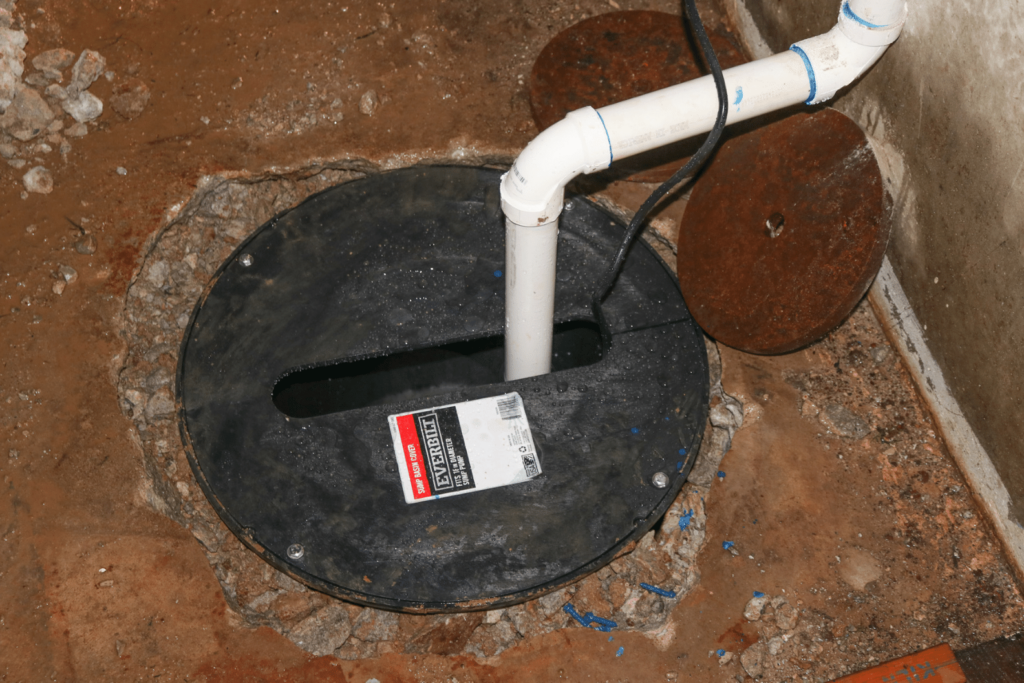Sump pumps. Without a doubt, one of the best safeguards against a plumbing emergency (specifically flooded basements) is a sump pump. According to BestPlaces, “Kansas City, Missouri gets 42 inches of rain, on average, per year. The US average is 38 inches of rain per year.” With above-average rainfall totals, it’s not hard to see why water damage in the basement could be a concern for Kansas City homeowners! On the flip side, the actual risk of basement moisture issues is largely tied to the house itself and the lot it resides on. Some will never need one installed, while others will need theirs every single year!
Since sump pumps have been a hot installation item for our team this year, I thought it would make sense to cover some of the finer details behind them. This includes providing a brief overview of what a sump pump actually is, the different types of sump pumps, maintenance tips for the winter and more!
What is a sump pump?
What better way to kick off a blog all about sump pumps than with a quick synopsis of what they are and why some homeowners need them so badly! Sump pumps are generally always found in the basement either in a pit underground or above the floor. The pit, also referred to as the sump pump basin, collects the water. Once the water reaches a certain level in the basin, it discharges the water to the outdoors.
With all of this, one key caveat to remember is that not every house is going to need a sump pump. If you’re purchasing a resale home, there’s a couple of things you’ll want to keep in mind before signing any closing papers. First, is there an existing sump pump and pit? No, this doesn’t automatically mean they’ve had some troubles with water damage, but it should nonetheless prompt you to ask a few questions about the past history! Secondly, are there any noticeable signs of past water damage in the basement? Possibly any water marks on the walls? While we think a sump pump is a great safety plan for anyone, getting answers to these questions before purchasing the home will certainly help in determining whether you need to be concerned about a flooded basement.
Types of sump pumps
When it comes to sump pumps, there are two primary types of pumps:
Submersible – Just as the name sounds, a submersible sump pump is designed to be installed in the basin and possesses the ability to function in the water. Considering they’re installed in the pit with a lid on top, these pumps are safer for homes with children, tend to not be very noisy and don’t stick out as much (which is particularly attractive for those with finished basements). Remember though, these are generally going to come at a higher price tag and are powered by electricity (hence the importance of having a back-up system installed as well).
Pedestal – More or less, a pedestal sump pump is essentially the exact opposite of a submersible pump. The pedestal (looks basically like a long stick) keeps the pump nowhere near the water. Even if the pit were to be full of water, it wouldn’t be hitting the pump. There is then an inlet pipe dropping down to the pit to bring water out. As such, these pumps tend to be noisier and pose an increased safety risk compared to their submersible alternatives.
Added Safety
The majority of sump pumps are powered by electricity. As such, what occasionally happens during a strong storm here in Kansas City? Heavy rainfall is accompanied by the power going out! Now if all you have is a primary sump pump that’s powered by electricity, you’d be out of luck if the power were to go out. So what’s the solution to ensure you’re always taken care of? A SUMP PUMP BATTERY BACKUP SYSTEM!
How a sump pump battery backup operates is fairly straightforward. They are designed to turn on automatically if the primary pump isn’t working or even if the water level exceeds what the primary pump can handle. All in all, it’s the perfect safeguard to have on-hand in case the power were to go out.
Routine Sump Pump Maintenance
Sump pumps are a unique plumbing appliance in that it likely doesn’t get used all that often. However, it’s also something that you can’t afford to not work when it’s needed. Luckily, sump pump maintenance is relatively simple. We recommend performing this routine maintenance every few months and particularly before any heavy rains! Pour a bucket of water in the pit and see if the pump turns on automatically to disperse the water out. If it doesn’t, something is definitely wrong with your sump pump. Make sure it’s dispersing the water well away from the house’s foundation as well! Depending on how familiar you are with the sump pump in the pit, remove the lid and make sure everything looks normal. Occasionally, the pump may fall on it’s side, in which case you’d want to make it upright.
If you are interested in getting your sump pump inspected before the next rainy season, don’t hesitate to give us a call at (816) 348-3481. A sump pump inspection can be completed quickly and it never hurts to have that added piece of mind.
Winter Maintenance
Following the tips above in terms of testing your sump pump will put you in a great position to be protected against any plumbing nightmares. However, we do receive questions from time-to-time about ensuring it’s able to survive the winter. After all, the colder months here in Kansas City can raise some plumbing concerns themselves. Frozen pipes, added insulation for water heaters, the list goes on!
When it comes to winterizing a sump pump, we still recommend testing it every few months, but here’s a few added tips to consider. Clean out any debris or dirt that may be residing in your sump pump pit. You don’t want this gunk to cause any clogs in the discharge pipes. Don’t unplug your sump pump either! While you might think an absence of rainfall means you’d be safe, remember how often the weather can change here in Kansas City. One day we have snowfall, the next it heats up and all of that melts. All of a sudden, you could be prone to a wet basement! Lastly, keep your heat on! For one, it’ll make the living conditions more comfortable, but also everyone knows it can get quite cold in the basement. It’s in your best interest to avoid any of the pipes from freezing.
Sump Pump Repair and Installation in Kansas City
Sump pumps are a critical piece of preventing plumbing emergencies from occurring. It’s as simple as that! As residential and commercial plumbers in Kansas City, we’ve seen first-hand what happens when a sump pump fails and the headaches it creates for homeowners. If you’re interested in learning more about our sump pump services or simply chatting with one of our residential plumbing experts, don’t hesitate to request a free quote. We provide both sump pump repair and sump pump installation services. In addition, we work throughout the entire Kansas City area, as well as all of the surrounding cities, including Parkville, Smithville, North Kansas City, Independence, Lenexa, Leawood and Grandview.


